- Home
- Kim Newman
Angels of Music Page 6
Angels of Music Read online
Page 6
‘We have come to an arrangement,’ said the Persian. ‘Advantageous for our Agency.’
Trilby and Christine entered the dressing room.
On the divan sat a small blonde girl, dressed all in white, posed like a ballerina in a tableau.
‘She’s not a doll,’ said Christine. ‘She can’t be.’
The girl’s head moved and she blinked. There was no clicking or whirring.
‘She must be the original, from which the mannequin-makers copied,’ said Trilby.
The girl’s chest swelled and contracted with breath. She gestured, showing the suppleness of her fingers. She picked up an apple from la Présidente’s basket, flicked out her nails and rolled the fruit in her hand, letting the peel slither away from the flesh in an unbroken ribbon, then crushed it to juice with a sudden, powerful squeeze.
Christine and Trilby walked around the divan, observing the newcomer from all angles, wondering at the ingenuity of her manufacture.
‘This is Olympia,’ said Erik, from behind the mirror. ‘She will be joining us for “music lessons”, and taking the departed Miss Adler’s place in our roster of agents.’
Olympia curtseyed.
‘It is a pleasure to meet you,’ she said. ‘I hope we shall be the best of friends.’
ACT TWO: LES VAMPIRES DE PARIS
‘Just a moment, ladies and gentlemen. Just a word before you go. We hope the memories of Dracula and Renfield won’t give you bad dreams, so just a word of reassurance. When you get home tonight and the lights have been turned out and you are afraid to look behind the curtains and you dread to see a face appear at the window… why, just pull yourself together and remember that after all there are such things.’
John Balderston, Dracula (1927)
I
IN THE EIGHTIES, the tune changed. The mad whirl of Paris became madder still. Those who saw their way to fast fortunes took every opportunity to puff up portfolios of dubious stock. At the end of each trading day, the speculators of the bourse de commerce waded through knee-deep drifts of tickertape, stepping over the bodies of those whose brains or hearts had burst. Fending off weariness with sniffs of cocaine, these young men – the sons of shocked, seething, respectable fathers – would repair to cafés, cabarets and casinos and conduct a nocturnal ronde of seductions, ruinations and foolish wagers. Monies gained by day on the market were thrown away by night on the card table or at the wheel. More than one chancer lost his clients’ funds before dipping into his own reserves.
A generation of artistes maudits – poets, painters, novelists, composers, actors, musicians, singers – were culled by absinthe and venereal disease, which ran through the city like a flood from the sewers. Many were driven mad by their muses even before their minds and bodies rotted from the green fairy or the pox. Fashions were set in suicide. Certain bridges became so popular with self-murderers that they were roped off from before sunset till after dawn. Fine sets of duelling pistols were broken up as the down-at-heel-and-drooling patronised pawnshops to spend their final francs on ‘just the one’ gun and ‘just the one’ ball.
Beyond electrically illuminated districts where money and madness burned bright were freezing, nighted slums. The poor and wretched were made poorer and more wretched by savage government measures. Influenced by mine-owners, industrialists and colossi of capital, the Opportunist Republicans eagerly pledged the full forces of the state to stamping out a strain of rebellion which sprung up in the blighted north and threatened to take hold throughout the country.
The Army of the Republic was ordered to Montsou to put down a miners’ strike with a ferociousness in excess of measures taken against rebel tribes in North Africa. There were French men and women who grew to hate and fear the tricolour flown by troops who marched towards them with bayonets fixed. Émile Zola looked to the miners, utterly defeated, and wrote, ‘Men were springing forth, a black avenging army, germinating slowly in the furrows, growing towards the harvests of the next century, and their germination would soon overturn the earth.’
Withal, it was a gay time – the Belle Époque.
In opera, audiences of the eighties applauded Gounod, Saint-Saëns, Delibes and Massenet. Cults sprung up around Berlioz and Bizet, dead too soon to enjoy the success in revival of works scorned on their premieres. The reign of Verdi, longer even than that of Victoria of Britain, continued, but the spectre of Wagner stalked Europe – ominous, rumbling chords beneath soaring arpeggios. Claques feuded and divas drove managements to distraction, but houses were packed.
The Opera Ghost Agency remained in business… though, as might have been expected, there was a turnover. In time, the first Angels moved on and were replaced by others, all talented and intrepid, each unique and extraordinary. The departure of Christine, his first protégée, left the Phantom bereft behind mask and mirror. He steeled his heart when selecting those who followed her. His first trio were singers, but the next line-up included a dancer. Then, Erik considered the dramatic arts – a veil will be drawn over the sorry debut and finale of Sybil Vane – before looking to other disciplines. Some specialists were engaged briefly, for a specific performance; others proved versatile enough to be held over for lengthy runs.
At the time of l’affaire du vampire, the Angels of Music were La Marmoset, Sophy and Unorna. On a variety bill, they could pass for an actress, a knife-thrower and a conjurer.
La Marmoset was the finest detective of either sex in Paris, which – whatever claims a patriotic English press might make concerning a certain resident of Baker Street – was to say the world. Once an independent investigator, often consulted by the Sûreté and the Deuxième Bureau, her agency was dissolved on the occasion of her marriage to one Mr Calhoun, a wealthy American whose current whereabouts were not known. Their union, evidently, had not been happy. The O.G.A. counted itself fortunate to have a Queen of Detectives on its lists. Other employers would scarcely have been as understanding of her habit of going disguised at all times. Fewer men had seen her true face than Erik’s. She owned up to many names and identities, though it seemed likely she was really Camille Bienville… or perhaps Tampa Morel… or any one of a dozen other young women with convincing documents, childhood memories, elderly relatives who would verify their identities on stacks of Bibles, and press cuttings supportive of whatever pasts they claimed.
Sophy Kratides was first to point out that La Marmoset’s London rival might be all well and good should you need one variety of cigar ash distinguished from another but was of singularly little practical use in more pressing matters. Coming to London as a naïve Greek lass, she had been seduced by a scoundrel, Harold Latimer, who imprisoned her in the household of a loathsome, tittering fellow named Wilson Kemp. The rogues starved and tortured Sophy’s brother, to make him sign over family money due to her. The Great Detective Sherlock Holmes amused himself by picking at threads dropped by a Greek interpreter and arrived at the scene of the abduction too late to prevent the murder of Paul Kratides. Furthermore, Mr Holmes, his reputedly cleverer brother and the dogged bobbies of Scotland Yard didn’t trouble to prevent the culprits leaving the country, spiriting Sophy along with them.
The impotence of such vaunted upholders of the law inspired her to a harsh assessment of herself. She detested being bundled up like a parcel and written off as a fainting damsel in distress. So, she made her first venture into extrajudicial execution, arranging the scene so the official verdict was that Latimer and Kemp had quarrelled and stabbed each other to death. Discovering unexpected talent and an inner reserve of Greek fire, she turned professional and rose to the first rank of a lucrative trade newly open to women in this changing century – assassination.
Unorna, the so-called Witch of Prague, bore the stigmata of heterochromia iridis. Her eyes were different colours – one a clear cold grey, the other a deep, warm brown so dark as to seem almost black. Born on the 29th of February in a bissextile year, she had only just passed her sixth birthday but was a grown woman. The girl with the st
range eyes had made a profound study of the occult. Her home city was the site of the magical feats of Rabbi Loew, Johannes Kepler, Scapinelli and Dee. In Prague, the golem was vivified, the Voynich Manuscript decoded and the Philosopher’s Stone hidden. Raised in the alchemical tradition, Unorna was apprenticed to the dwarf sorcerer Keyork Arabian. Latterly, she roamed the world, adding to her store of arcane knowledge. She learned the power to cloud men’s minds in the mountain lamaseries of Tibet and collected strange orchids from the mangrove swamps of the Andaman Islands. She read the Scroll of Thoth in the secret vaults beneath the great pyramid and tracked the wendigo through the forested territories of the Canadian North-West. An adept of the art of mesmerism, she commanded the attention of Erik – whose mastery of the field was formerly unrivalled – by outstaring him. She offered her services to the O.G.A. in exchange for tutelage in certain practices of Australian aborigines. The Phantom, she believed, had mastered the disciplines known as the Voice, the power to persuade, and the Shout, the power to destroy.
It is often said that men like Erik never change, never learn – for, as geniuses and prodigies, why should they? But Irene Adler’s declaration of independence, Trilby O’Ferrall’s fading talents and Christine Daaé’s ultimate defection persuaded him to moderate his puppet-mastering. Wind-up dolls had their uses, but clockwork women could only achieve so much. Olympia was not one of his favourite agents, though she was effective in some cases. Impossible to seduce or strangle, the dancing mannequin was fetched out of her cabinet on occasion to tempt and trap gentlemen who were inclined to emulate Bluebeard and stock their cellars with murdered wives. For all that, she was pretty but dull. Erik understood what Trilby’s previous tutor meant when – with her declarations of devotion hollow in his ears – he declared, ‘Ah, but it is only Svengali talking to himself again.’
With the Witch of Prague, our Phantom could not work his spell… so, with La Marmoset and Sophy, he would not. Opera itself was changing. Traditionally, producers conducted themselves like the late Emperor, peering down at an army from a hilltop, imposing their iron will upon underlings who would pay the butcher’s bill on the battlefield. Many an impresario kept a portrait or a bust of Napoléon in his study, and would in private moments turn his hat sideways and put his hand inside his buttoned jacket to see how it felt. Now, a new breed of director whispered suggestions rather than barked orders, coaxed with sugar lumps rather than broke with the whip. Work was done in collaboration rather than by decree. Erik’s first Angels of Music were biddable chorus girls; now, he dealt with potential or actual prima donnas.
The Persian, perhaps, was subtly influential in this change. With the Phantom behind the mirror, he was charged with day-to-day business, issuing emoluments and expenses, meeting with clients, even approving or vetoing cases taken on by the Opera Ghost Agency. He had Erik’s trust.
Most mornings, the Persian would be in the Café de la Paix from eleven o’clock till noon, drinking bitter coffee, eating almond biscuits, and reading the papers. Those who wished to engage the Agency were invited to approach him.
On a day in late September, the Persian sat at his usual table, sipped his usual coffee, nibbled his usual biscuit and unfolded his usual Figaro to find an unusual envelope slipped into the newspaper. Impressed in the black wax seal was the outline of a bat.
The mark of Les Vampires.
Inside was a card which bluntly stated:
‘The Grand Vampire wishes to meet with the Director of the Opera Ghost Agency, on a confidential matter.’
The Persian tapped the stiff card against his teeth.
A rare occasion, he concluded.
For this, Erik must come up from his cellar.
II
DISGUISED AS A provincial schoolmistress on her first trip to Paris, La Marmoset strolled through the Quartier Latin. In character, she tutted at the prices displayed in shop windows and steered well away from the idlers, loungers and probable footpads loitering on every corner. She envisioned the scrubbed, attentive faces of her class back in Tôtes and thought of the lessons she would give upon her return. She was determined to see the worst Paris had to offer, so she could caution her charges against moral peril.
Young men all around were leering at her, she had no doubt. Even with the autumn chill, many wore blouses unbuttoned to the waist and impractically tight britches. They lolled and swore and scratched and smoked and ogled. She felt a rising prickle in her chest, but suppressed the fervour of disgust. For the sake of the children, she would know something of sin. And she would know it before 14.39 on Friday, when her train home left Gare Saint-Lazare. She had an authentic return ticket in her purse – though the schoolmistress would have ceased to exist by the time the train pulled out.
In Place Saint-Michel, she approached a sleek, slick fellow idling by the statue of the Archangel trampling the Devil. As likely a prospect for sin as any, and cleaner than most. She asked for directions to the Musée des Thermes. He offered to escort her there. As they strolled, they talked… and the schoolmistress fell away from the Queen of Detectives like leaves from a tree.
La Marmoset kept up with the criminal underworld, of course. She recognised her new beau as Vénénos, Vice-President in Charge of Poison in the Cabinet of Les Vampires. A rising man. His superiors were well advised to watch what they ate or drank in his company, though his signature was the use of less obvious means of getting poison into a person. He gave those condemned by Les Vampires cause to fear tobacco, soap, tooth-powder, toilet paper, moustache wax, postage stamps and adhesive bandages. Sometimes, even word that Vénénos was out to get a named individual was enough to drive a prospective victim to suicide on the principle of getting the agony over with quickly.
This negotiation was delicate.
The Phantom of the Opera and the Grand Vampire were shadowmen, seldom in the company of even their closest intimates. They preferred to issue dictates through speaking tubes from behind magic mirrors.
After discussing and rejecting several venues, La Marmoset and Vénénos settled on Suite 13 at the Hôtel du Libre Échange as suitable for the parley. The establishment normally catered to bourgeois husbands and wives conducting respectable assignations with acknowledged mistresses and lovers.
The meeting of Opera Ghost and Grand Vampire was set, naturally, for midnight.
Business concluded, La Marmoset pulled on the schoolteacher again and slapped Vénénos as if he had made an abominable suggestion. She stalked off, blushing violently. His surprised face was a memory of missed opportunity she would take to her spinster’s death bed.
At the Hôtel du Libre Échange, special arrangements would be needed. Monsieur Morillon, the manager, would have to be terrified into removing heart-shaped pillows and explicit Japanese prints, then paid off to hang thick black drapes over the frilled pink pretties festooning the suite.
La Marmoset would have paid a hundred francs to see Erik and the Vampire cosy in a love nest with champagne and oysters, but stifled the thought.
One giggled at masked men at one’s peril.
Was she not a woman in a succession of masks? In her experience, all women were given – or driven – to masks. As a mere Princess of Detectives, she had learned to wear masks which did not seem to be masks. With a twist of a scarf or a touch of paint, she could be someone new, someone else entirely. A fat schoolgirl, a starving widow and a brazen harlot within the same hour, on the same street. Often, she wore men’s clothes to enter places barred to her original sex.
She made a finer man than many born to it, she had been told.
Who was she really? She didn’t know any more.
That schoolmistress, burned along with her unused railway ticket, was as much a person as the woman who put her on and took her off like a bonnet.
No mask could be worse than the naked face of Mr Calhoun when a rage was on him.
Just once in her adult life had she dropped all her disguises and let a man see her true face. She had given up her independ
ence, her profession, her reputation and her thousand names and faces to become one person… Mrs Calhoun. The man for whom she had made such sacrifice served her so brutally she needed to fetch her abandoned make-up kit to cover the bruises.
Like Erik, she finally had no face. Only masks – masks of paper, masks of paint, masks of skin.
She remembered Mr Calhoun’s final face – staring furious eyes and open screaming mouth as the waters closed over him, the anchor tied to his ankles pulling him down into the dark.
Standing by the Seine, she at last became the Woman Who Was No One.
Mrs Calhoun drowned with her husband. La Marmoset’s agency was wound up, her ties with the Sûreté and the Deuxième Bureau sundered. The earnings of her successful career were in her husband’s name, and she had contrived it so he was officially missing, not dead. Lawyers in America controlled his estate and would have no sympathy for her… Tampa Morel, the name signed to the marriage register, wasn’t an identity which would hold up in court, so legal access to her own fortune or her husband’s was impossible.
She thought of joining Mr Calhoun eternally, swimming down to cling to his corpse.
If The Woman Who Was No One dies, who would care?
She thought of L’Inconnue de la Seine… a case known to all detectives.
Some twenty-five years earlier, a young woman – believed to be not French – was fished out of the river, stuck like a specimen bug on a spar of driftwood. A presumed suicide by drowning. Her cold face smiled like the Mona Lisa, and her wax death mask became the template for replicas sold all over the city. That unnamed face was everywhere, even after all this time: in posters, bas-reliefs, prints sold to tourists and popular masks.
L’Inconnue de la Seine, by virtue of an obscure and pathetic death, became a heroine of France. Even with all the publicity, no one came forward to identify her. La Marmoset thought that highly suspicious. Were l’Inconnue her case, she would not have so readily written it up as a suicide.

 The Bloody Red Baron
The Bloody Red Baron Anno Dracula
Anno Dracula Dracula Cha Cha Cha
Dracula Cha Cha Cha Anno Dracula 1999
Anno Dracula 1999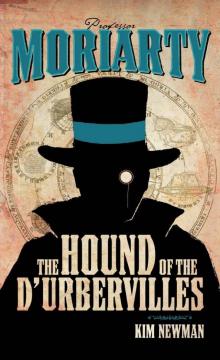 Moriarty: The Hound of the D'Urbervilles
Moriarty: The Hound of the D'Urbervilles Angels of Music
Angels of Music The Man From the Diogenes Club
The Man From the Diogenes Club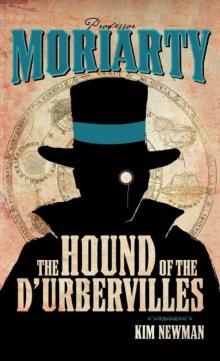 Professor Moriarty: The Hound Of The D’urbervilles
Professor Moriarty: The Hound Of The D’urbervilles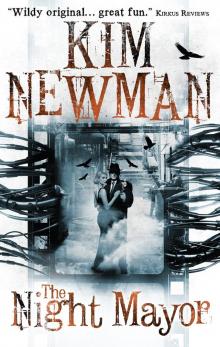 The Night Mayor
The Night Mayor Back in the USSA
Back in the USSA Jago
Jago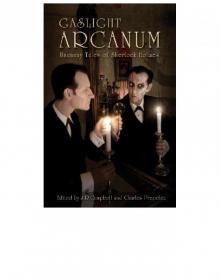 Gaslight Arcanum: Uncanny Tales of Sherlock Holmes
Gaslight Arcanum: Uncanny Tales of Sherlock Holmes The Quorum
The Quorum Anno Dracula 1899 and Other Stories
Anno Dracula 1899 and Other Stories Life's Lottery
Life's Lottery The Secrets of Drearcliff Grange School
The Secrets of Drearcliff Grange School Anno Dracula ad-1
Anno Dracula ad-1 The Bloody Red Baron: 1918 ad-2
The Bloody Red Baron: 1918 ad-2 An English Ghost Story
An English Ghost Story The Haunting of Drearcliff Grange School
The Haunting of Drearcliff Grange School The Other Side of Midnight
The Other Side of Midnight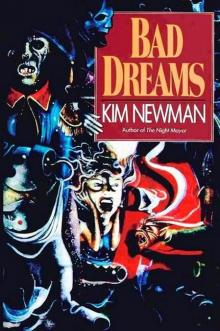 Bad Dreams
Bad Dreams Anno Dracula--One Thousand Monsters
Anno Dracula--One Thousand Monsters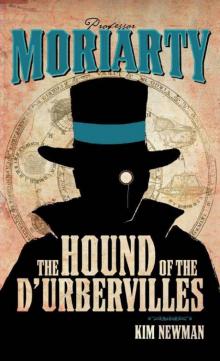 The Hound Of The D’urbervilles
The Hound Of The D’urbervilles The Bloody Red Baron: Anno Dracula 1918
The Bloody Red Baron: Anno Dracula 1918